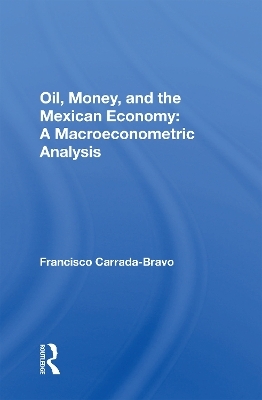
Oil, Money, And The Mexican Economy
A Macroeconometric Analysis
Seiten
2023
Routledge (Verlag)
978-0-367-16710-3 (ISBN)
Routledge (Verlag)
978-0-367-16710-3 (ISBN)
In the mid-1970s unemployment, inflation and monetary disturbances were dominant forces in the Mexican economy. Beginning in late 1977, however the situation drastically changed due to the discovery of enormous oil fields. Dr Carrada constructs a macro-econometric model to deal in the short-run with structural features of Mexico's economy.
In the mid-1970s unemployment, inflation and monetary disturbances were dominant forces in the Mexican economy. Beginning in late 1977, however the situation drastically changed. The discovery of enormous oil fields, combined with a structural and social factors, vastly improved the nation's prospects and in terms of business cycles, its economy moved from trough to peak. In assessing these changes, Dr Carrada constructs a macro-econometric model- based on the monetary approach to the balance of payments- to deal in the short-run with structural features of Mexico's economy. He then applied his model to a variety of scenarios in order to explore the short-term dynamic impact of oil revenues on real incomes, prices, inflation, money, supply and balance of payments. Incorporating theoretical and empirical evidence of hoe expectations affect levels of economic activity and inflation, Dr Carrada's model is applicable also to the conditions of other oil-rich developing countries
In the mid-1970s unemployment, inflation and monetary disturbances were dominant forces in the Mexican economy. Beginning in late 1977, however the situation drastically changed. The discovery of enormous oil fields, combined with a structural and social factors, vastly improved the nation's prospects and in terms of business cycles, its economy moved from trough to peak. In assessing these changes, Dr Carrada constructs a macro-econometric model- based on the monetary approach to the balance of payments- to deal in the short-run with structural features of Mexico's economy. He then applied his model to a variety of scenarios in order to explore the short-term dynamic impact of oil revenues on real incomes, prices, inflation, money, supply and balance of payments. Incorporating theoretical and empirical evidence of hoe expectations affect levels of economic activity and inflation, Dr Carrada's model is applicable also to the conditions of other oil-rich developing countries
Dr Carrada is director of economic studies and associate professor of economics at the Monterrey Institute of Technology in Mexico.
1 MEXICO: A STRUCTURAL ANALYSIS 2 THE DESCRIPTION OF THE MODEL, 3 EMPIRICAL EVIDENCE FOR MEXICO 4 SUMMARY REPORT, GENERAL CONCLUSIONS, AND RECOMMENDATIONS
| Erscheinungsdatum | 10.07.2023 |
|---|---|
| Verlagsort | London |
| Sprache | englisch |
| Maße | 152 x 229 mm |
| Gewicht | 240 g |
| Themenwelt | Geisteswissenschaften ► Geschichte ► Regional- / Ländergeschichte |
| Sozialwissenschaften ► Politik / Verwaltung | |
| Wirtschaft ► Volkswirtschaftslehre ► Makroökonomie | |
| ISBN-10 | 0-367-16710-7 / 0367167107 |
| ISBN-13 | 978-0-367-16710-3 / 9780367167103 |
| Zustand | Neuware |
| Haben Sie eine Frage zum Produkt? |
Mehr entdecken
aus dem Bereich
aus dem Bereich
Erinnerungen
Buch | Softcover (2024)
Pantheon (Verlag)
16,00 €


